Candidate with the most votes does not necessarily win US election
The United States uses a system known as the Electoral College system to elect a president once every four years, however, many people are in the dark as to what that means and how it works.
Under the Electoral College system each US state is assigned a number of electors proportional to the population of the congressional delegation.
Whichever candidate wins the majority of electors’ votes becomes president.
In other words, under this method, the candidate with the most votes nationwide does not necessarily win the election, as was the case with Hillary Clinton in 2016, not to mention George W Bush versus Al Gore in 2000.
Number of Electors
Each state is allotted one elector for each US representative and Senator it has. Washington DC doesn't have representation in congress but it receives three electors, the same number as the least populous state, the number of congressional seats each state gets is determined by the decennial census, the 2020 census is happening right now, which means that some states will have a different number of electoral votes for the next presidential election in 2024.
How did trump win in 2016
Well college won the popular vote by 2.8 million votes. So in 2016. I only called the winner, which is why I got acknowledged by Trump who lost the popular vote, and in 2020 I'm only calling the winner.
Allan Lichtman, Professor of History, American University
So, Clinton won the popular vote by 2.8 million, but lost the Electoral College vote, thus, Donald Trump became President Trump. Why has this archaic and cumbersome system not been supplanted by something more democratic.
Will it be easy, or even possible to get rid of the Electoral College, it's very difficult because those states that really hold the election in in their hands get a lot of extra attention they get a lot of visits they get a lot of, you know, advertising and attention that they obviously feel, you know is, is beneficial to them. But it's a it's a relic. And it should be eliminated.
Hillary Clinton, Former Presidential Candidate
Now, the way that she talked about Electoral College is the type of things that we're going to try to re introduce into the psyche. Clinton says that the 2016 Electoral College cannot be eliminated.
The implication here is that the notion of democracy might get eliminated in the process, and also just the fact that we're going to try to not just talk about the democratic or the republican platforms well. Joining us today in the studio is Gloria La Riva she is a Socialist Party USA presidential candidates.
The Electoral College debate
So we know that the Electoral College system is a matter of ongoing debate supporters of the electoral college argue that it is fundamental to American federalism, but why is the system, so controversial and deemed undemocratic by many both within and outside of the United States?
It's important to understand the roots of the foundation of the Electoral College in the foundation of the US government, and also why it is essentially undemocratic just that aspect alone, of the Electoral College. First, it was after a rebellion called Shay's rebellion in the 1700s, when it was clear that some of the founders of the United States wanted more control over the idea of a direct democracy. And so the Electoral College is specifically for the election of the President, not other political offices, but the president, because they regarded the executive as the most important office to have control, in order to protect private property. That is, the founders of the US, were capitalists.
Gloria La Riva, Presidential Candidate for US Socialist Party
As a rule, electors are nominated at party conventions and their names are given to the State election officials.
When Americans in each state vote for their president of choice, they are technically casting their ballot for the slate of electors representing the ticket since Electors’ names do not usually appear on the ballot. Most states follow the principle of winner takes all whereby whichever party's slate of electors receives the most votes gets all of the electoral votes.
Maine and Nebraska are the two exceptions. Both give two at large delegates to whoever wins the state overall and then one to the winner of each individual congressional district, a candidate needs to win a majority of 538 electoral votes to be elected president.
So what happens if no candidate wins a majority of electoral votes?
Well that almost never happened but in that case, the Senate chooses the vice president and the House chooses the president. The whole idea of the Electoral College system always causes heated arguments among Americans.
The 2016 presidential elections were controversial in many respects, but mostly since Trump did not win the popular vote. He lost that by a pretty wide margin. What if this time around, Trump wins the presidency by the electoral count again: what effect will that have on Americans?
Could history repeat itself?
The 2016 presidential elections were controversial in many respects, but mostly since Trump did not win the popular vote. He lost that by a pretty wide margin of nearly 3 million. What if this time around, Trump wins the presidency by the electoral count again: what effect will that have on Americans?
I believe that the question of what will happen on November 3 with this conflict that has been apparent between the Democrats and the Republicans, and the attempt by Trump to create chaos, to create doubt in the outcome of the election. He is doing this in case he loses both the popular vote and the Electoral College.
Gloria La Riva, Presidential Candidate for US Socialist Party
How are the ballots cast?
Each state’s delegation gets to cast a single vote, meaning that large states have the same weight as small states, similar to the Senate. In December, in a largely ceremonial gesture, the electors cast ballots for president and vice president and are expected to follow the vote of their state.
In the end, the votes are counted at a joint session of Congress, and the president is officially elected and later inaugurated on January 20.
On rare occasions, some electors have decided to cast their votes for a different candidate. These are known as faithless electors and the behavior is protected by the Constitution. But a recent ruling of the Supreme Court says that a state is allowed to require presidential electors to support the winner of its popular vote and may punish or replace those who don’t.
Supreme Court controversy
Eleanor Goldfield a Creative Radical, Journalist and Filmmaker whose documentary film Hard Road of Hope was selected by Cannes International Independent Film Festival has this to say about the 2020 US presidential election:
Trump's pick for the Supreme Court, Amy Coney Barrett, whom he had actually picked for a federal court judge, was kind of a needling of the democrats because the democrats set up their typical placid resistance against Barrett, and Trump pushed her through to become a federal judge.
One of her more infamous sayings was that a legal career is but a means to an end. And that end is building the kingdom of God, which sounds absolutely terrifying when you consider the control of the Christian right, the extremist Christian right, has on politics, not least of our all our, our Vice President Pence, the fact remains the same, that the Supreme Court is a very contentious issue right now as we're, you know, very, very close less than a month and a half away from the election. And, again, by the time you watch Barrett might already have been appointed as Supreme Court justice.
While President Donald Trump and former vice-president Joe Biden are the Republican and Democrat nominees for the 2020 U.S. election, various third-party candidates will also appear on the ballots. As a third choice, you don’t hear about them.
Why are third party and independent candidates important?
In the previous presidential election more than 7.6 million Americans cast their votes for someone other than the Republican nominee Donald Trump or Democratic candidate Hillary Clinton.
So who are these people? Here’s a quick rundown of a few of these parties and their presidential candidates. Howie Hawkins is the Green Party Presidential candidate, this year’s The Socialist Party USA Presidential candidate Gloria La Riva, and Libertarian Party Presidential candidate is Jo Jorgensen.
COVID-19 exacerbates Election confusion
The COVID-19 pandemic has sunk the world into unprecedented chaos, having disrupted the lives of millions and put a cap on social gatherings and other activities. As Election Day looms closer, it is difficult to recall a presidential election for which the act of voting has been potentially more confusing.
Voting by mail, piece of cake
A historic number of ballots could be cast by mail in the election as a result of the current pandemic and Democratic efforts to sign up absentee voters.
United States citizens are set to vote on November 3 like never before, with the number of Americans casting their ballots by mail expected to surge amid the pandemic.
With more than half of the electorate expected to cast ballots by mail, attention has turned to the patchwork of state policies and laws that determine the parameters for such voting, with some states quickly moving to adopt what are considered best practices for this year's unusual election.
But Mail-in voting has never been an easy practice. In each election more than half of mail-in votes get rejected because of missed deadlines or technical flaws.
Just in Florida, More than 35-thousand vote-by-mail ballots didn’t count in the recent primary.
Nearly 66 percent of the rejected absentee ballots were disqualified because they arrived after Florida’s Election Day deadline. The rest didn’t meet signature match requirements used by county election supervisors to verify voters’ identities.
Experts say this could be a huge problem in November. More than 100-thousand vote-by-mail ballots could get dismissed this way.
2020 will not be 2000, 2000 was the recount of one state under very tight deadlines, but that was met with stiffer and about 2020 years beyond slide of absentee ballots and the number of states that have extended the deadline for Windows ballots can come in, postmarked on election day but when they can come in God's putting a huge amount of faith in the postal service to deliver the ballot, so I guess my nightmare nightmare scenario is there's a prolonged count because of all the absentee ballot, and then lo and behold, after whatever that deadline is in the state three days after the election. A week after the election, a bunch of ballots come in at the post office just kind of lost. And so it's not the fault of the voter that those votes weren't counted, what do you do then that bumps into the Electoral College deadlines,
Ben Ginsburg, US lawyer
The United States does not have one Central Election Commission that runs elections for the entire country. Instead, because of the way in which our federal government works and this goes all the way back to the very founding of the country, our elections are administered state by state, and even within state you can go down to the local level and see that elections are administered differently across localities within the same state.
Michael McDonald, Professor of Political Science, University of Florida
Potential Mail-in fraud
Trump has made out mail-in voting to be a bad thing, claiming without evidence that mail ballots may purposely be manipulated to be sent to Democratic areas and not Republican areas. He has said the system of ballot return is not “secure and convenient”, and will lead to fraud. Does he have a point?
I think Trump has been making so many false claims of misleading statements in order to misdirect, the population the voters to think that there will be massive fraud during the election and undermine the, the election process. So I think he's absolutely absurd in this in this allegation. He's trying to make sure that that people don't trust the results of the, of the election. He's been doing this consistently all through, through this whole electoral process. So, not to be taken seriously. Except for the fact that perhaps many of his followers will believe that, but but the things he's saying are just blatantly untrue.
Sunnil Freeman, VP candidate for Gloria law Rivas Socialist Party USA
Now, while many authorities in the US encourage people to practice safe ways to participate in the upcoming election, the US President himself has time and again called on people to ignore dangers of COVID-19 and vote in person on November 3. But will Americans listen to him in mass, since he himself has now caught COVID-19?
Donald Trump has called mail ballots corrupt. Trump has expressed a preference for in-person voting and voter ID laws as a way to verify and authenticate those casting ballots. Without a way to check at the polls, Trump believes mail-in voting would create widespread fraud, though there's no evidence of this in states that rely predominantly on mail ballots.
Ballot Harvesting
Republicans have also warned about ballot harvesting, which is the collection of mail ballots by volunteers. Ballot harvesting is already illegal in many US states as it is. Trump even tweeted that the only way to get an honest count is to ban ballot harvesting and ensure voter ID laws. The US president has also suggested that Republicans wouldn't be able to win elections with expanded mail-in voting. But historically, Republicans have voted at higher rates through mail, with Democrats only recently closing the gap.
Trump has been questioning the legitimacy of US elections for years, though his reason for being skeptical changes on an almost weekly basis. After the 2016 election, when he lost the popular vote but won the Electoral College, Trump claimed “millions and millions” of people voted illegally in person. Is he scared this time around that he may lose because of mail-in voting since his popularity has slid?
Yes, I think in many reasons he is frightened that he might lose the election. I'll lose the popular vote in the electoral vote. And therefore, lose the presidency. Among those charges, the one you mentioned about millions and millions so called millions and millions of illegal votes is just blatantly historically demonstrated to be false. There are almost never these sorts of false attempts to double vote or illegally vote in an election. And in fact, Trump himself was encouraging his voters his supporters to vote mail in and then vote in person to which is a crime. So conceivably many of his followers could be criminally prosecuted if they actually followed through on his suggestion but but no no I don't think there are, there will be or ever have been, you know, millions of people illegally voting in elections.
Sunnil Freeman, VP candidate for Gloria law Rivas Socialist Party USA
One thing most Americans agree on is that a major shift to mail-in voting by November would require a massive commitment from the federal government.
Can the US authorities pull off something like this?
A group of Democrats has introduced legislation that would allow early voting for 20 days in all states and ease restrictions on absentee ballots. But Trump and Republicans are accusing Democrats of playing politics during a health crisis for proposing legislation and new funding for elections.
In addition, there is a dispute in Capitol Hill over whether the federal government should give additional funding for expanding vote-by-mail. There is already a 2 trillion dollar rescue package including 400 million in election assistance for states. However many advocates and Democrats believe much more is needed to overhaul the system in time.
The U-S House Speaker Nancy Pelosi believes states need up to 4 billion dollar to adequately fund such changes. She's indicated her interest in boosting election funding in the fourth round of coronavirus relief, though she's already encountering resistance from Republicans. That has prompted Democratic-aligned reform and advocacy groups to launch national campaigns to pressure federal and local lawmakers through calls, emails, texting and ads to adopt voting reforms amid the pandemic.
The disputes continue and nothing has become certain. The Election Day draws closer and people are confused. If the U-S authorities don’t set aside their differences, they might witness the lowest turnout ever in the history of America. After all, safety is much more important than electing a president.
As a well known human rights lawyer, being well versed in the US electoral system, his take on the Supreme Court, basically as a tool to demand that folks vote for Biden, is most important.
(the Supreme Court has) been a tool for years. I mean because the Democrats have offered so little for so long, especially to the working class and poor; I mean the democrats have done as much as anyone to get rid of welfare to offshore jobs, you know they've had very little to offer the working class, the one thing they have had to offer our judges more liberal judges who will uphold labour laws who will uphold women's rights who will uphold rights for people of different genders people of different sexual orientations. They have done that and so, but it looks like very likely, no matter who people vote for that this judge that Trump has picked may very well be on the bench before the election even happened.
Daniel Kovalik, American human rights lawyer
At least 35 killed in Israeli strikes on Rafah as vital aid corridors cut off
A singer with Palestine keffiyeh: Eurovision contest kicks off with pro-Gaza protests
Oxford students protest against Gaza genocide
West asked Iran 'don't hit Israel hard', lower intensity of True Promise: FM
India state-owned company shipped munitions to Israel amid Gaza war: Report
May 7: ‘Axis of Resistance’ operations against Israeli occupation
VIDEO | Austrian students continue pro-Gaza encampment
‘Wider escalation’: Yemen warns Israel of more retaliatory attacks if Rafah invaded


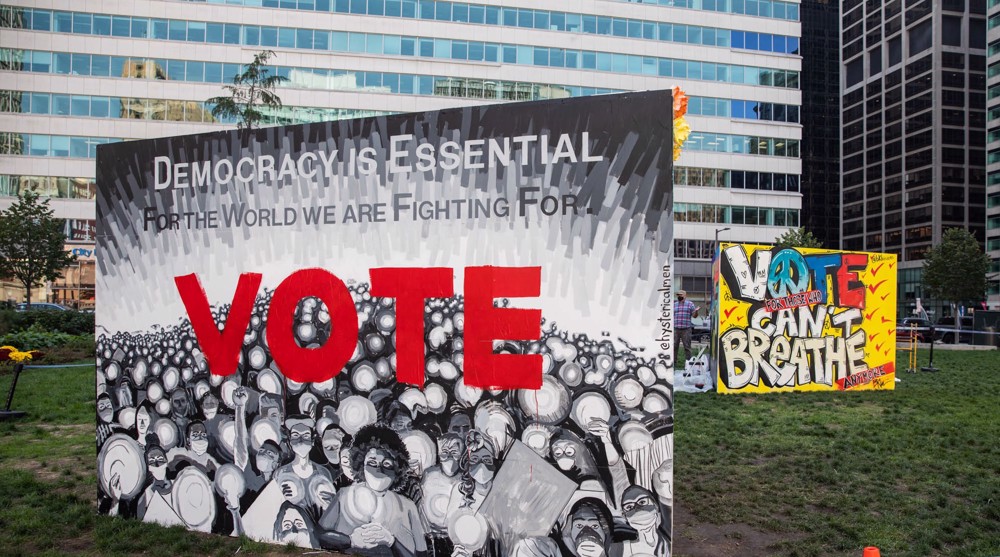










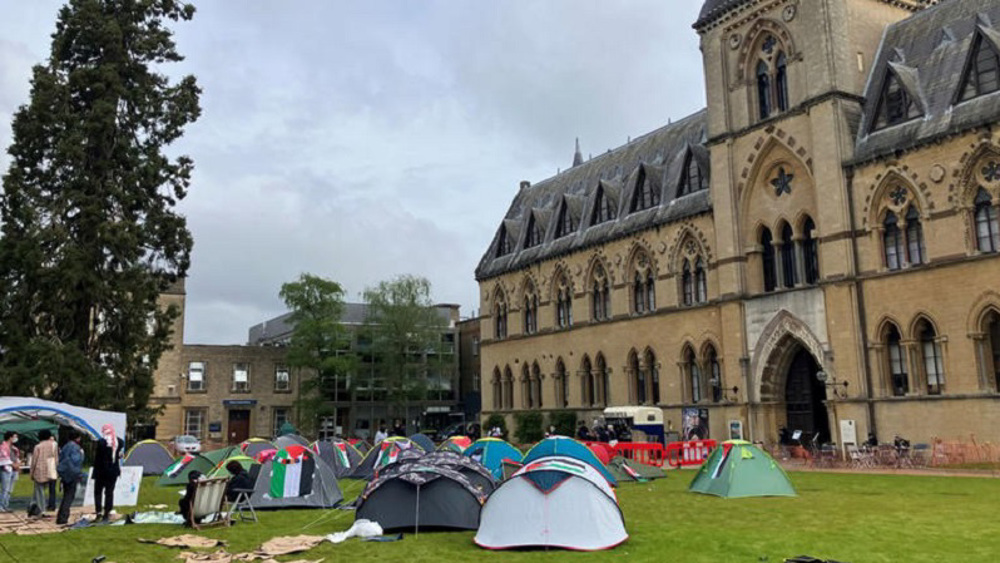
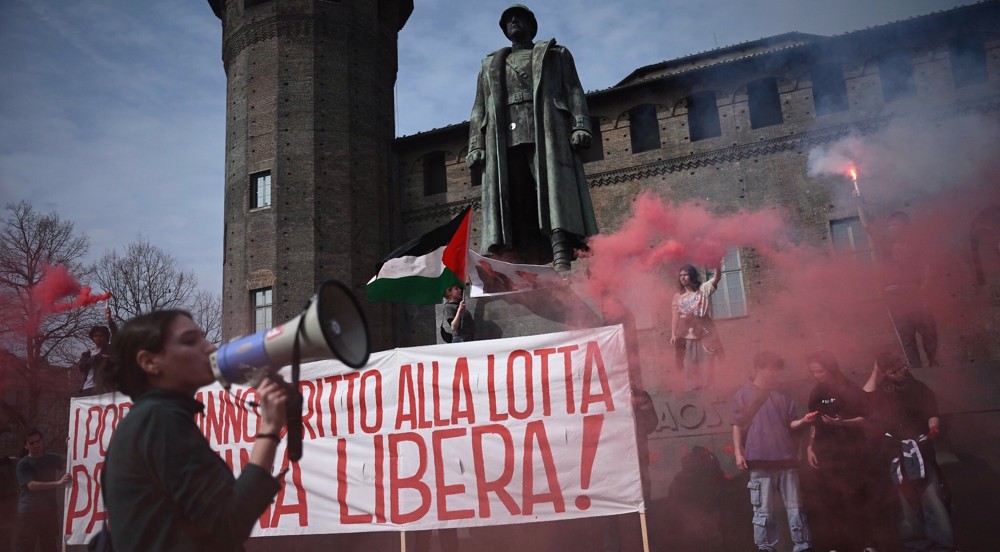
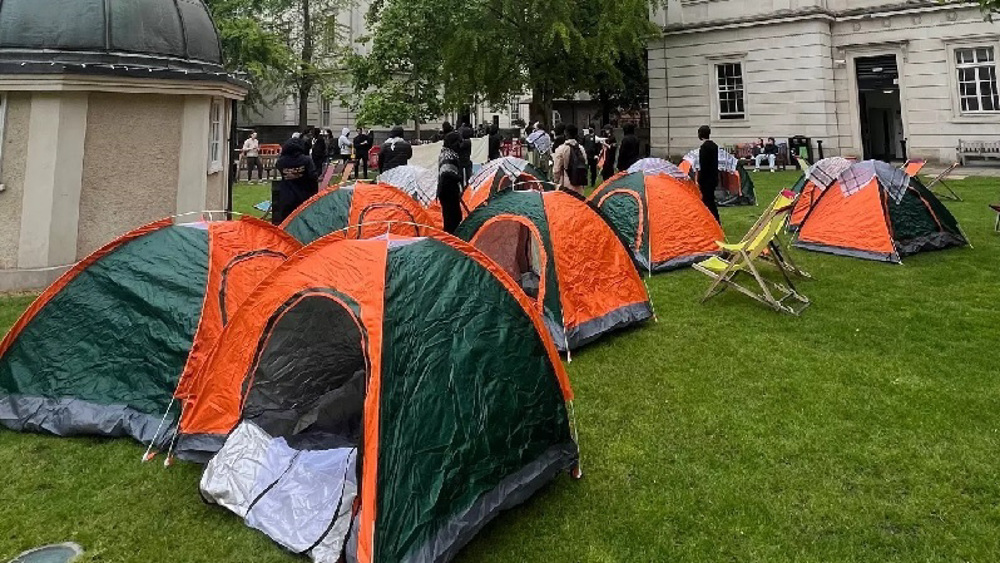



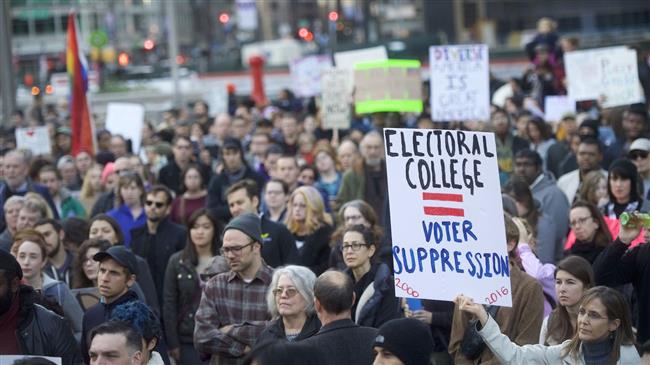
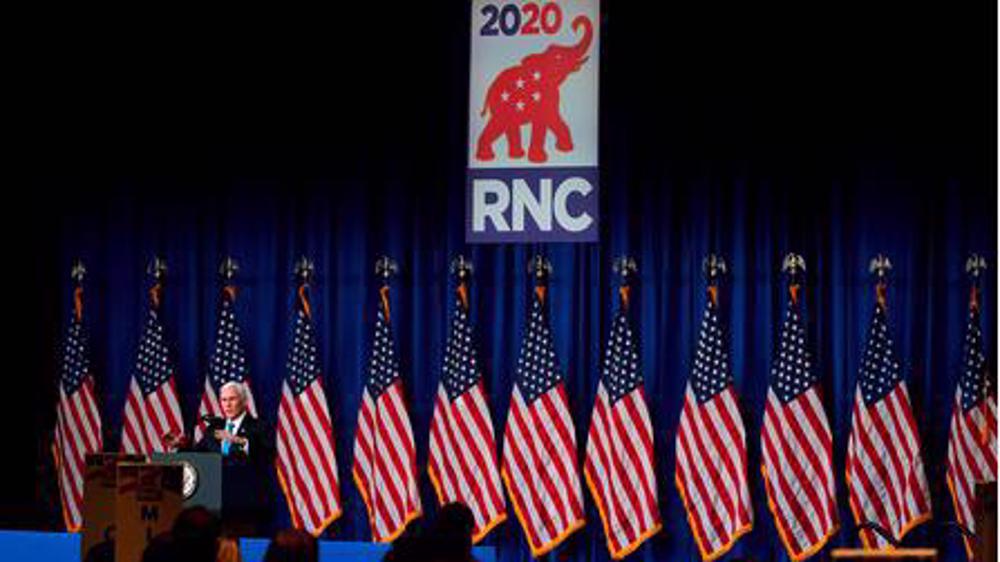

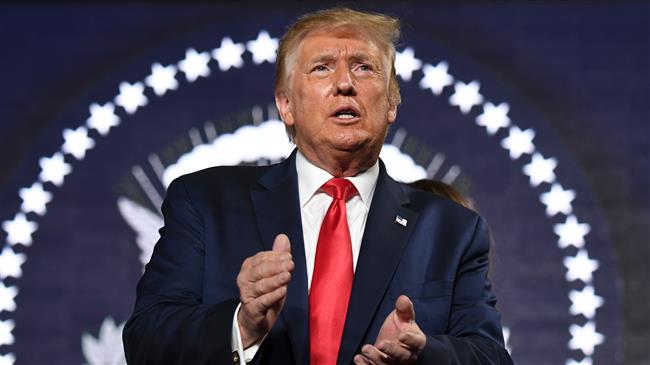

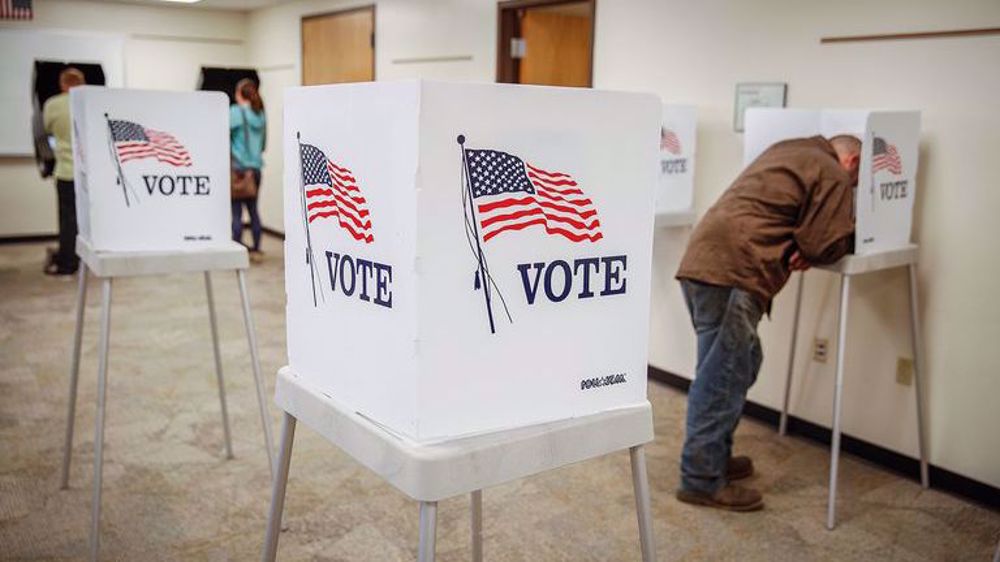



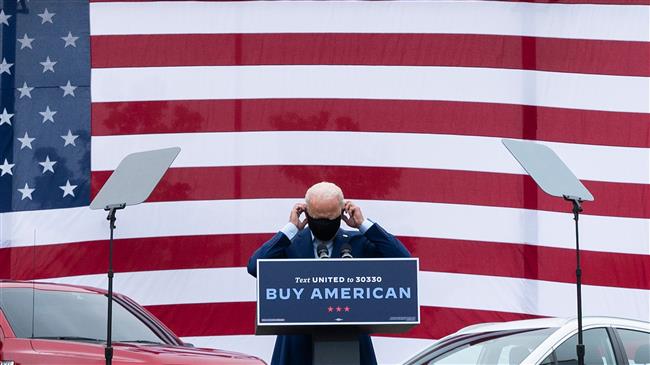

 This makes it easy to access the Press TV website
This makes it easy to access the Press TV website